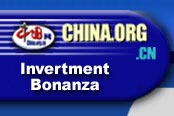|
The State will revoke the priority usage of domestic equipment, personnel and services in China's joint oil explorations with foreign companies early next year, said a senior government official.
Zhong Weizhi, director-general of the Department of Geography Exploration under the Ministry of Land and Resources, said this is part of the State's amendment on two sets of regulations for exploiting offshore and onshore petroleum resources in co-operation with foreign parties, which were formulated in 1982 and 1993.
"Some of the regulations involve protective articles on domestic companies and must be changed before China's entry into the World Trade Organization," he said.
Sources from the State Economic and Trade Commission said the amendment, the first of its kind, is also expected to rule out the mandate on technology transfer from overseas companies during the contract period.
An analyst said the move will greatly boost the co-operation between Chinese and overseas oil companies.
Sources also said the amendment will extend the exclusive right of joint onshore oil exploration with overseas oil companies to China Petrochemical Corp (Sinopec Group), one of China's oil giants along with China National Petroleum Corp (CNPC).
No other oil companies will be authorized to co-operate with foreign oil companies to launch onshore oil exploration, he said.
The monopoly of China National Offshore Oil Corp (CNOOC) on offshore oil exploration will remain intact, he added.
In a sweeping restructuring of its energy sector in 1998, the State divided the industry between two State-owned oil giants - China National Petroleum Corp and Sinopec Group. After the reshuffle, CNPC has controlled oil assets in the north and west of China, and Sinopec Group the rest, including Shengli oilfield, the nation's second largest, in Shandong Province.
According to the current regulation, CNPC is the only domestic oil company to co-operate with overseas companies to tap oil resources on Chinese soil.
To date, CNPC has signed more than 30 oil contracts with overseas oil companies introducing foreign capital of US$1 billion. CNOOC has inked 146 contracts with 70 oil firms from 18 countries and regions since its establishment in 1982.
Sources said the recent amendment is a minor modification of the regulations and will not touch on big issues, such as the construction of oil pipelines and product sharing contracts.
But Li Runsheng, director of the Policy and Regulation Department of the State Administration of Petroleum and Chemical Industries, urged the government to call off the restrictions on Chinese companies as operators and purchasers as soon as possible.
"These restrictions have dampened the enthusiasm of foreign investors to some degree," he said.
According to current practices, domestic oil companies usually hold 51 per cent of the exploration projects and foreign companies hold the rest.
(China Daily 12/25/2000)
| 